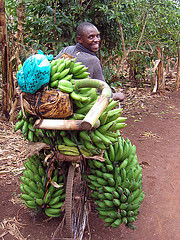MOTIVATION
For smallholder agriculture to succeed in Africa South of the Sahara, smallholder farmers need to take advantage of economies of scale in procuring inputs and marketing their produce. Smallholders can achieve this by acting collectively, thereby achieving better prices on input and output markets. In recent years, governments and donor agencies have shown renewed interest in rural producer organizations as a means of improving access to markets. IFPRI’s research in this area [http://www.ifpri.org/book-744/node/5374]— from 2009 to 2012, in partnership with the University of Hohenheim and the Institute for the Study of Labor—was to improve smallholder livelihoods by strengthening the ability of rural producer organizations to improve their members’ access to input and output markets. In particular, the research focused on ways to affect organizational performance in Senegal, Uganda, and Zambia by enhancing member participation.
OUTCOMES
- IFPRI conducted a marketing training course for 49 farmer groups in Senegal in January 2012. When compared to a control groups of 26 farmer groups who did not receive training, the course was estimated to have had a strong and positive effect on people’s willingness to engage in collective marketing. Interestingly, it was found that members who participated in the training positively affected the attitude to collective marketing of nonparticipating members within their organizations.
- IFPRI’s working capital credit intervention looked at whether loaning working capital (i.e. the cash needed for day-to-day operations) to farmers groups results in improved marketing outcomes for farmers by allowing them to get cash immediately upon delivery of a product to the group. This research, based on extensive randomized trials, had a significant impact on increasing the output of rural producer organizations, almost doubling the amount collected by the groups. Through this increase in marketed volume, the intervention allowed the groups to obtain higher prices for their products. Furthermore, these positive results have prompted several groups to continue with a similar program using evidence from IFPRI’s study as a way to attract loans from commercial banks to sustain the fund for partial cash payments.



